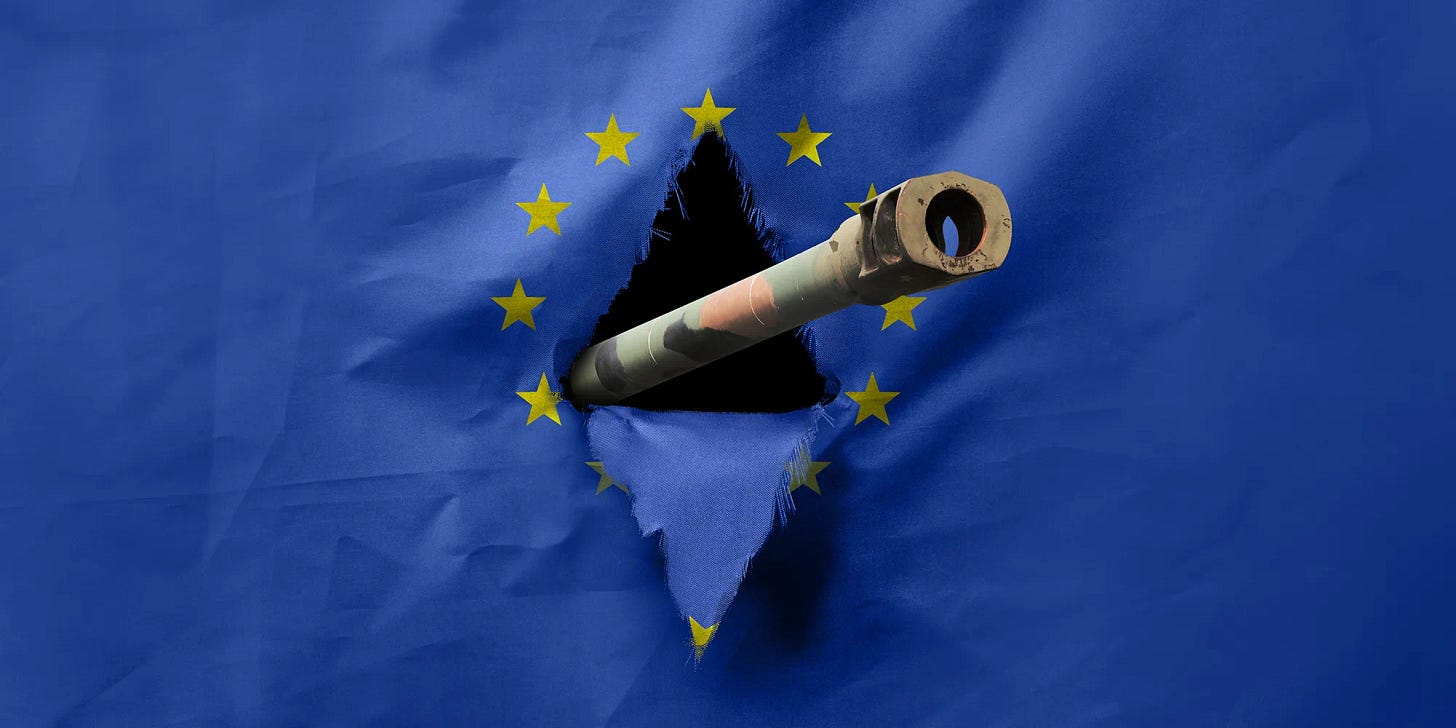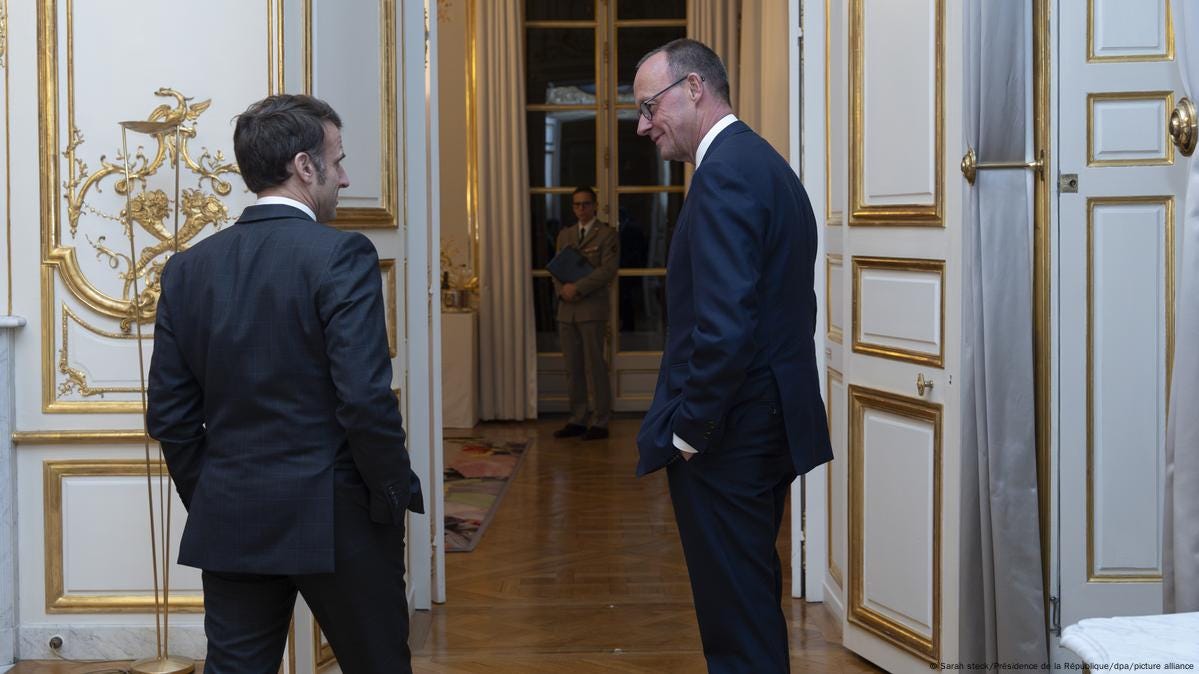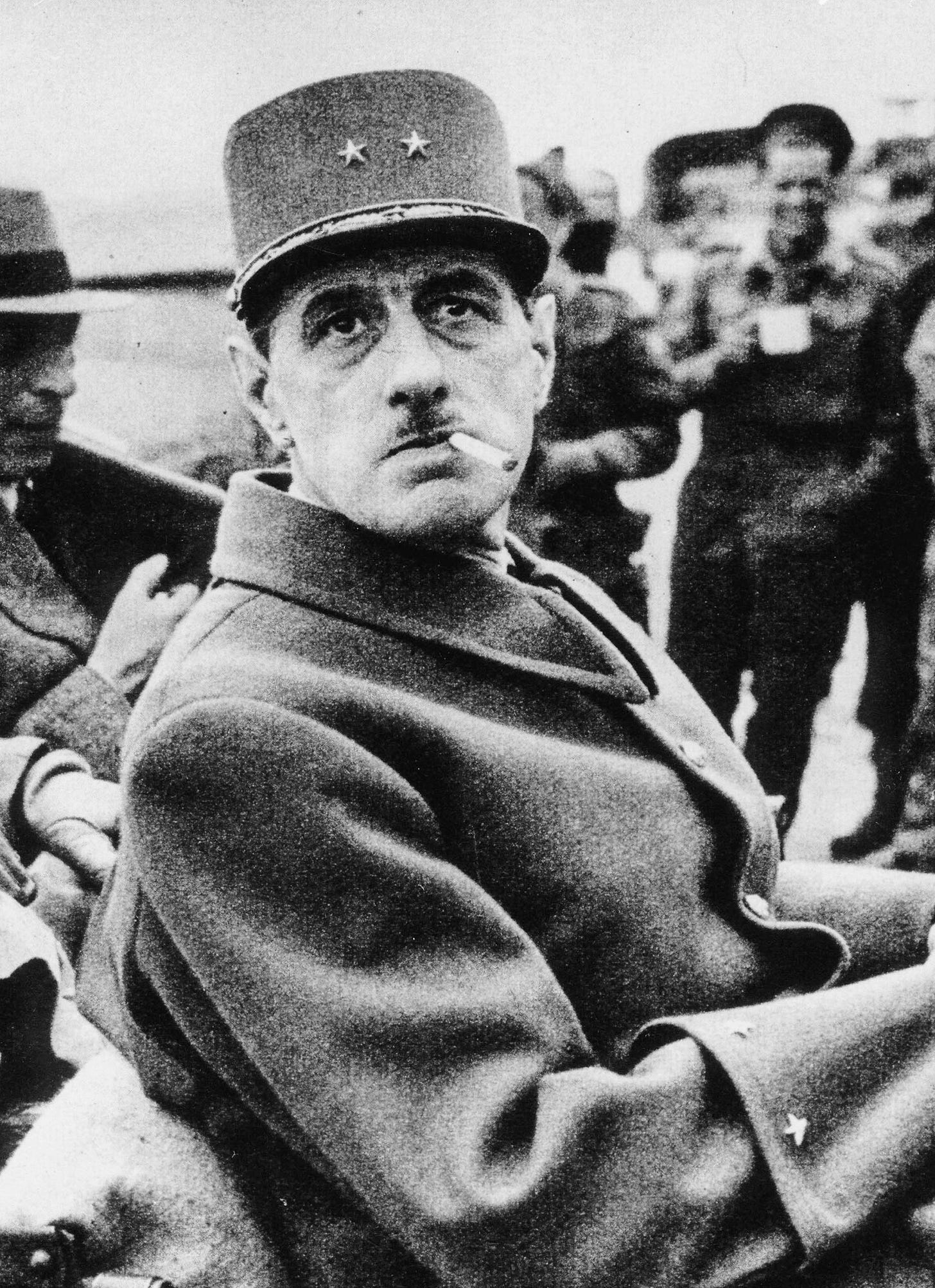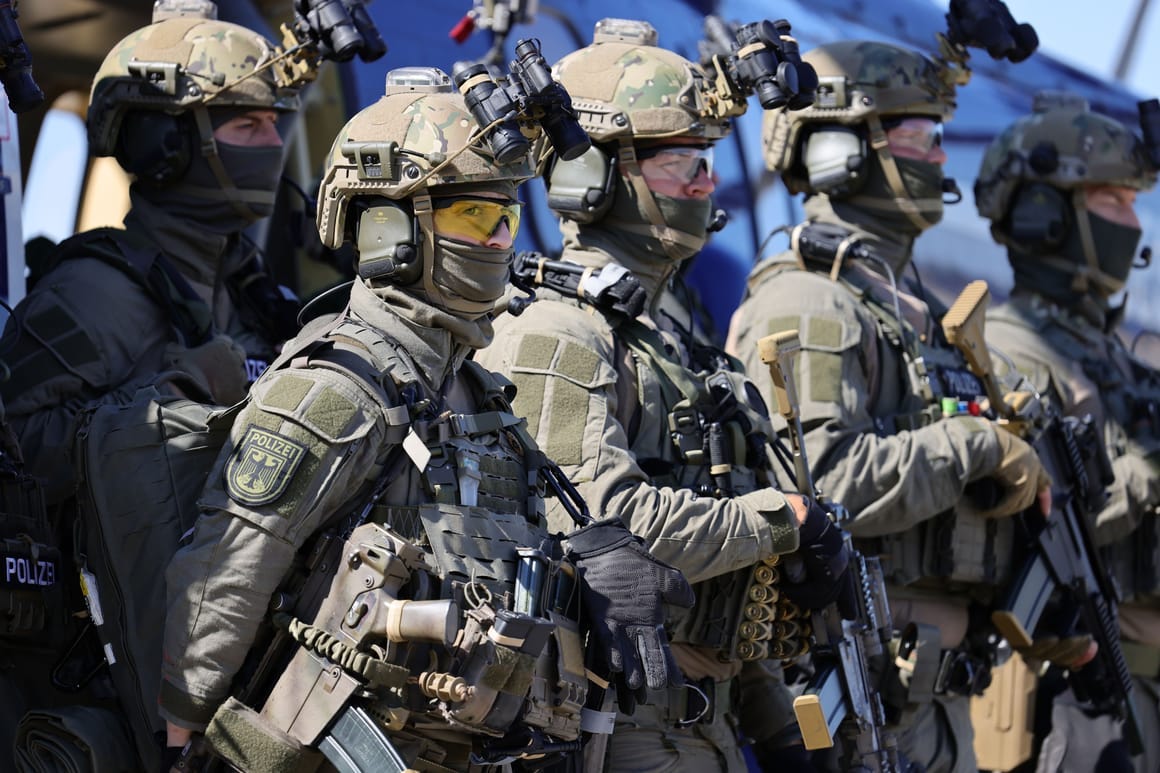SurRealPolitik: France and European Strategic Autonomy
📡 ‘If you’re right too early, you’re wrong’. And so the great realignment begins…
If there’s one constant in world politics, it’s that France loves to aggravate folks in Washington, DC. For over 70 years, French presidents have taken turns annoying U.S. leaders, and Macron? He’s just carrying the torch. But what does it say about European security and the long-lambasted ‘Strategic Autonomy'?
🌍 But first, here’s what happened recently
🇫🇷 Amid the global outcry from world leaders over Donald Trump’s 180° policy shift, last week, French President Macron issued one of his strongest warnings yet about growing security threats in Europe, declaring, “Ukraine has become a global conflict.” In a national address on Wednesday, he called on France and the European Union to step up efforts to bolster their military strength, even suggesting the possibility of extending France’s nuclear deterrent to the wider EU
His address came as EU leaders prepared for an emergency summit yesterday (Thursday), where they discussed how to prepare for a world in which US military support is no longer unconditional—it is evidently clear now that it is not. Here are the summary bullet points of his address:
“I want to believe America will stand by our side, but we must prepare for that not to be the case,” he said. He expressed willingness to work with other European countries—Germany, in particular—to strengthen the continent’s collective security, something France has called for since the 1960s.
He directed his government to increase defense spending from 2.1% to 3.5% of GDP within five years, aiming to achieve this through reforms rather than tax hikes. He also pushed for France to “reindustrialize” and build self-sufficient military supply chains—an ambitious goal easier said than done
Macron announced that military commanders from countries willing to commit peacekeeping troops in Ukraine will convene next week. “Russia has become a threat to France and Europe,” he stated, making it clear that any path to peace cannot come at Ukraine’s expense. Moscow, for its part, said that Macron was an “out-of-touch storyteller.” Even went so far as to compare him to Napoleon, kindly reminding him of what happened to the “Grande Armée”.
Evidently, even Putin doesn’t seem to remember what happened back then, as Moscovites had set tourch to Moscow in order for the city not to fall in Napoleon’s hands.
🕓 But what’s the historical context?
It started with Charles de Gaulle, in the 1960s, who didn’t just push back against the US—he made it one of the cornerstones of French policy by criticizing America’s involvement in Vietnam, opposing the dominance of the US dollar, developing France’s own nuclear weapons, and even pulling the country out of NATO’s military command—yes, he was quite the leader.
Years later, in 2003, Jacques Chirac kept that independent streak alive, refusing to send French troops to Iraq—a decision that didn’t sit well with Washington and that led to the infamous ‘French bashing’ we all know today.
And then there’s Macron. His insistence that Europe learn to stand up for itself was not always, to put it mildly, well received.
From the US’s perspective, France had always been considered a separate class of ally in Europe i.e. able to think and act for itself, regardless of US ‘directives’
Back to Macron: When he called NATO “brain dead” in 2019, it didn’t go over well in Washington, raising eyebrows at the Pentagon and CIA ironically enough, these roles have clearly been reversed today—whereby the US are not putting the existance of the alliance in question, whereas France is standing by it.
When Biden unveiled a military pact with Australia and the UK in 2021, France reacted with rare diplomatic fury, recalling its ambassador in the US for ‘consultation' catching US officials off guard. Meanwhile, Macron’s decision to maintain dialogue with Putin after the Ukraine invasion only deepened frustration in Washington, where many saw it as undermining Western unity. (again, notice the irony today?)
But his biggest sin, at least in Washington’s eyes? His relentless push for European “strategic autonomy”—a fancy way of saying that Europe should have the military and economic strength to chart its own course. For NATO diehards, this was pure heresy.
And now? The cracks in the transatlantic alliance are turning into full-blown fractures. The Trump administration seems to be undercutting allies left and right, and suddenly, everyone’s realizing that maybe—just maybe— Europe really does need a Plan B.
⌛ History Has a Funny Way of Repeating Itself
If this all feels familiar, that’s because it is. Let’s rewind to 1956.
Back then, Britain and France were still hungover from losing their empires, so when Egypt nationalized the Suez Canal, they teamed up to take it back—militarily. Enter US President Dwight Eisenhower, who, instead of backing them up, forced them to stand down. The French were furious. Eisenhower had been a WWII hero in their eyes, but now? Paris felt betrayed and humiliated. Not unlike what we’re seeing today.
Was Eisenhower wrong? Nope. Did the French see it that way? Absolutely not.
That moment left a lasting scar on French foreign policy. It’s a big reason why Macron (and all his predecessors, and—in all probability— his successors) is so obsessed with Europe reducing its reliance on U.S. military power.
For years, his calls for an independent European defense were brushed off as classic French posturing. But now that Trump is back and cozying up to Moscow, suddenly, that idea isn’t sounding so crazy.
💡 Old Fears, New Urgency
Suez taught France a hard lesson: the U.S. will always put its own interests first (logical thinking for any country). That realization led to France developing its own nukes and eventually pulling out of NATO’s military command in 1966 (a decision later reversed by Sarkozy in 2008).
Today, Macron’s push for “strategic autonomy” echoes de Gaulle’s skepticism of America. And with Trump openly questioning NATO’s value and making deals with Russia behind Europe’s back, it’s hard to argue that the French don’t have a point.
For years, Macron was dismissed as an alarmist. His critics said he was exaggerating the risks and that his real motive was just boosting France’s defense industry.
Nobody likes a Cassandra, especially if they’re French (Don’t ask why).
But now? The return of Trump has changed the game. Even Germany—long America’s most loyal European ally—is starting to rethink its security strategy. Newly elected Chancellor Friedrich Merz has openly discussed reducing Germany’s dependence on the U.S. nuclear umbrella and strengthening military ties with France and the UK.
Merz’s first official visit? Paris. The agenda? Europe’s defense future. If that doesn’t scream “times are changing,” nothing does.
👀 De Gaulle’s Shadow Looms Large
The French obsession with standing on their own two feet isn’t new. De Gaulle’s complicated relationship with Washington—sometimes cooperative, often tense—set the stage for modern French foreign policy.
The Suez Crisis was a turning point. The U.S. had forced France and Britain to back down while Moscow was threatening intervention. That moment cemented de Gaulle’s belief that relying on America was a very bad idea. He famously quoted ‘The truth is that Americans will end up being hated by everyone. Even by their most unconditional allies’.
Ten years later, he acted on that belief, yanking France out of NATO’s military command and doubling down on an independent defense strategy.
Now, with Trump’s return, the question isn’t whether de Gaulle was right—it’s whether Europe waited too long to act on the lesson.
⚖️ Can Europe Actually Defend Itself?
Here’s the problem: for decades, U.S. military power has been so overwhelming that European defense independence felt almost… unnecessary. Even today, trying to replicate America’s capabilities still remains a massive challenge.
Experts say it would take years for Europe to develop essential military infrastructure like command-and-control systems, intelligence satellites, and long-range weapons.
Countries like Germany and Poland have long structured their defense policies around America’s security guarantees. But with Trump hinting at a potential realignment with Russia, some European leaders are starting to panic. They worry that failing to prepare for a world where the US is no longer their safety net could be a catastrophic mistake.
In a bold move reflecting Europe's shifting defense posture, this week has seen a franzy of announcements from European leaders, namely:
🇵🇱 Poland unveiling plans to expand its armed forces from 200K to 500K personnel, including reservists. They also announced plans to acquire nuclear weapons of their own—yes, scary times indeed…
🇩🇪 Concurrently, Germany is exploring the possibility of integrating into France's nuclear deterrent, signaling a strategic pivot from traditional reliance on US nuclear capabilities—an unheard of about-turn for German policy since WWII. Amid these developments…
🇫🇷 France started intelligence sharing with Ukraine, stepping in as Donald Trump announced he would pause and block all military aid and inteligence sharing with the Ukrainians, most probably as a pressuring tool for them to come back to the negotiating table—the ‘art of the deal’, but this time with Ukrainian civilians dying as a results of Russian strikes
🇪🇺 European Commission President Ursula von der Leyen has announced the "ReArm Europe" plan, a comprehensive strategy aiming to mobilize a mamoth €800 billion to bolster the Europe’s defense infrastructure (with potential boycott of US weapons manufacturers)— how that will be financed remains to be seen, and in true European fashion, disagreements between member states are already appearing
But alas, it all seems to be backfiring for Donald J. Trump
💭 Breaking the Taboo
🇪🇺 Despite the urgency, European leaders are treading carefully. Many EU countries remain suspicious of France’s leadership on this issue. Macron knows he can’t declare victory just yet. Even the French themselves are weary of Macron’s attemps and, for some political parties, his ‘warmongering’.
But his allies believe that the Trump factor has finally forced Europe to confront an uncomfortable reality: the assumption that America will always be there to protect Europe is no longer a safe bet.
Europeans must break the intellectual taboo of thinking about security without the US. For years, the idea of European defense autonomy was dismissed as unrealistic, unnecessary, or just plain French arrogance.
But now?
Trump’s actions may leave Europe with no other choice. And in Paris, Macron’s advisors are well aware of this shift. It’s an ‘I told you so’ moment for France. And this time, nobody is rolling their eyes.
✍️ Also worth noting
🇮🇹 Italy PM Giorgia Meloni has put a proposal forward to extend NATO’s article 5 to Ukraine without necessarily having to admit Ukraine into NATO.
🇵🇱 Elon Musk keeps piling gaffs by telling the Polish Foreign Minister to ‘Be quiet’ and calling him a ‘small man’ further allienating what once was the most pro-American country in Europe
📸 Photo of the day
🛰 France launched a new satelitte (CSO-3) via the Ariane 6 rocket launch, trailed by two Rafal fighter jets, further cementing France’s role as a capable security replacement for Ukraine and European Countries.







